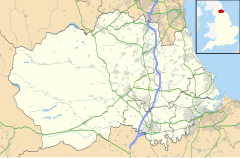Holwick
This article has multiple issues. Please help improve it or discuss these issues on the talk page. (Learn how and when to remove these messages)
|
| Holwick | |
|---|---|
 | |
Location within County Durham | |
| Population | 75 (2021 census) |
| OS grid reference | NY905269 |
| Civil parish |
|
| Unitary authority | |
| Ceremonial county | |
| Region | |
| Country | England |
| Sovereign state | United Kingdom |
| Post town | Barnard Castle |
| Postcode district | DL12 |
| Police | Durham |
| Fire | County Durham and Darlington |
| Ambulance | North East |
| UK Parliament | |
Holwick is a hamlet[1] and civil parish in Teesdale, County Durham (district), England. Located in the Pennine hills, the hamlet consists of a few houses spread along a road in the pattern of a linear settlement. As the population taken at the 2021 Census was 75.
Being south of the River Tees, Holwick lies within the historic boundaries of the North Riding of Yorkshire.[2] Along with the rest of the former Startforth Rural District it was transferred to County Durham for administrative and ceremonial purposes on 1 April 1974, under the provisions of the Local Government Act 1972. In May 2013, the newly registered flag of the North Riding was first unveiled at the village, owing to its being one of the most northerly settlements in Yorkshire.[3]
It has a public house, the Strathmore Arms, and a campsite. Holwick sits not far from the south bank of the River Tees, about 2 miles north-west of Middleton-in-Teesdale and opposite Newbiggin, both villages on the other side of the river. Nearby are the High Force and Low Force waterfalls. The surrounding landscape is high moorland and fells.
Geography and administration
[edit]Civic history
[edit]Holwick is part of the Bishop Auckland parliamentary constituency, which is represented in parliament by Dehenna Davison (Conservative).
The local police force is Durham Constabulary. Holwick is in the Wear and Tees division and its nearest police station is in Barnard Castle.
History
[edit]The earliest evidence of habitation in the area comes from Mesolithic microliths dating back at least 6000 years. The people who left them, however, were not settled in the area, but hunted there during the summer. Agriculture began in the Neolithic period, and the remains of buildings have been found from the Bronze Age. The present-day village of Holwick was first recorded in 1235, though the origin of the name is uncertain, believed to mean either "dairy farm in a hollow" or "in the holly". In addition to hill farming of sheep, lead mining and iron smelting was conducted in the mediæval period, with lead mining and stone quarrying increasing in importance throughout Teesdale in the 18th century. The Wynch Bridge, thought to be the first suspension bridge in Britain, was built across the Tees near Holwick in 1704, and collapsed in 1802, killing one. It was repaired but finally replaced in 1830. Substantial quarrying and lead mining did not continue into the 20th century, and the economy of the village has since returned to sheep farming.
References
[edit]- ^ "Ordnance Survey Open Data Names Download (NY82)". Ordnance Survey Data Hub. Ordnance Survey. Retrieved 2 January 2025.
- ^ Himelfield, Dave (22 November 2020). "The remote village once on the tip of Yorkshire - and people wish it still was". Yorkshire Live. Retrieved 2 January 2025.
- ^ Braddy, Adrian (7 May 2013). "New flag for North Riding of Yorkshire unveiled at Holwick in Teesdale". Dalesman. Retrieved 5 October 2017.
Durham County Council & Northumberland County Council. "Local History: Holwick (County Durham)". Keys to the Past. Retrieved 12 January 2005.
External links
[edit]![]() Media related to Holwick at Wikimedia Commons
Media related to Holwick at Wikimedia Commons

